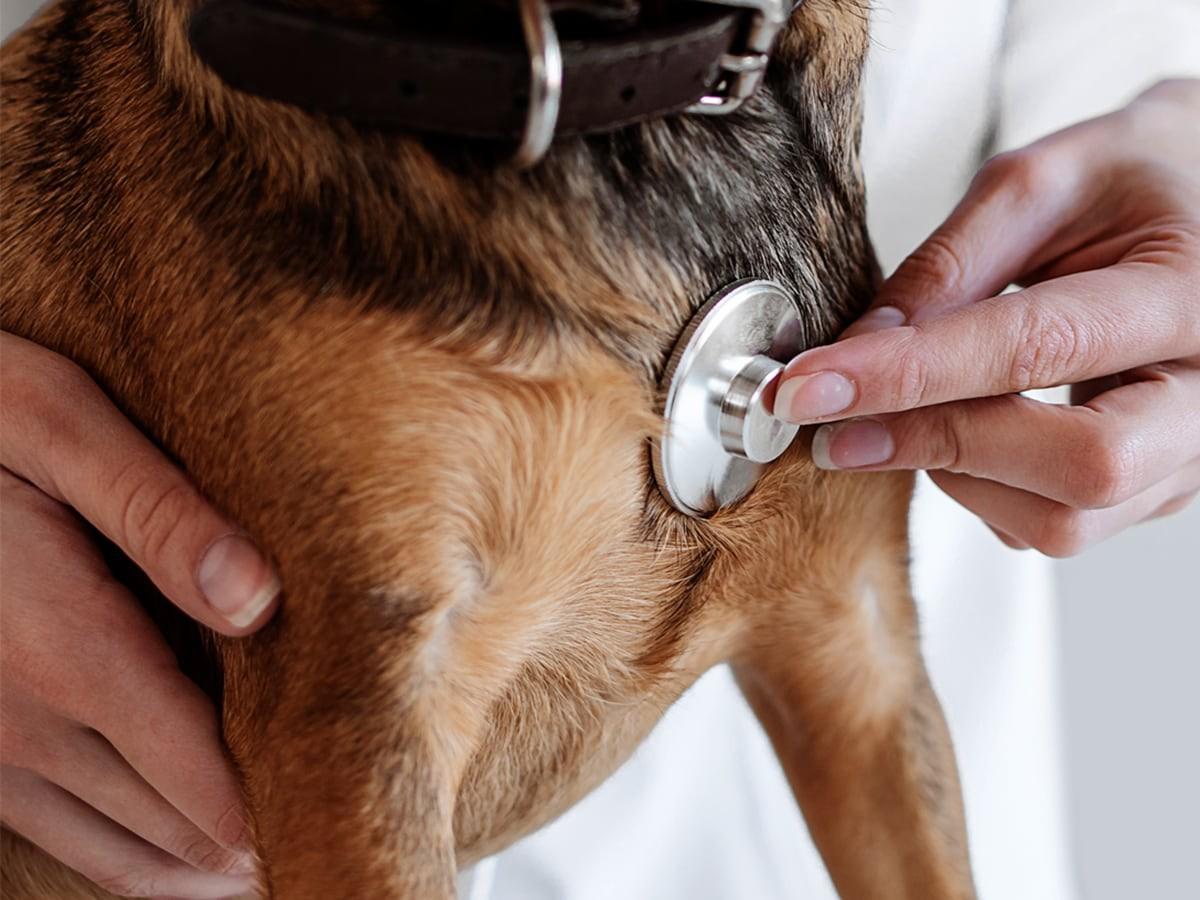Heartworms are a common parasitic worm transmitted by mosquitos. When a dog is bitten by an infected mosquito, the parasites are deposited into their bloodstream and start to reproduce4. Heartworm disease is a serious condition that can be fatal to pets it left untreated4. Treatment for heartworms can be lengthy and expensive, so it is highly recommended that pets always be on heartworm preventatives in areas where these parasites are common.
This article will break down how heartworm disease is diagnosed and treated, and the costs of treatment.
What Are the Symptoms of Heartworms in Dogs?
Whether or not your pet will display symptoms depends on a few factors like the number of worms, the amount of time they have been infected, and their activity level. Pets with more serious cases of heartworm disease may also show the following symptoms4:
Lethargy
Cough
Exercise intolerance
Collapse
Sudden death
Trouble breathing
Weight loss
Excessive panting
If left untreated, heartworms can lead to heart failure4.
Read More: Does Pet Insurance Cover Heartworm Treatment?
How is Heartworm Disease Diagnosed?
Heartworm tests can be administered by your vet, and it is highly recommended that pets be tested every year. Results only take a few minutes, so your vet should be able to tell you during your visit whether your pet is positive or negative for heartworms. On average, heartworm tests cost between $35 - $751.
How are Heartworms Treated?
Heartworm treatment typically requires weakening the adult heartworms and preventing them reproducing, restricting the pet’s activity, and then killing the adult heartworms2. This process is carried out by:
Prednisone and Doxycycline: Heartworm treatment starts with an oral dose of prednisone and doxycycline to reduce the risk that the pet will have a negative reaction to the death of the adult hormones in their bloodstream later4.
Heartworm Preventive: Giving the dog heartworm preventive will kill the juvenile heartworms in their bloodstream. The first dose is often administered during a day long stay at the vet to allow for monitoring of any adverse reactions4. Heartworm preventive can be given monthly, at home, following this visit4.
Melarsomine Injections: Melarsomine injections are used to kill adult heartworms. The first injection is given after the 30-day doxycycline treatment is completed4. Beginning this point in treatment, exercise should be restricted. A second melarsomine injection will be given 30 days after the first, and the third and final injection should be given the day after4. Exercise restriction should continue for 6 – 8 weeks after the final melarsomine injection.
Microfilariae Test: Microfilariae tests are used to determine if juvenile heartworms are present in the blood stream. 30 days after the final melarsomine injection, your vet will test administer a microfilariae test4.
Heartworm and Microfilariae Tests: Finally, 9 months after your pets 3rd melarsomine injection, your vet will once again test for heartworms and microfilariae4.
Read more: Is Pet Insurance Worth It?
How Much is Heartworm Treatment for Dogs?
According to the ASPCA, heartworm treatment in dogs costs an average of $1,0005. Treatment can be much more expensive in severe cases that require surgical intervention.
What Percent of Dogs Survive Heartworm Treatment?
According to VCA Animal Hospitals, over 95% of dogs survive heartworm treatment3.
Is Heartworm Preventative Expensive?
The average cost of heartworm prevent is $6 - $18 per month3. Vets will often sell 3 – 6 month supplies of preventive, and pet parents can also opt for an injectable heartworm preventive which can protect a pet again heartworms for 6 months6. This vaccine is only recommended for dogs 6 months and older6.
How Can I Save on Heartworm Treatment?
Enrolling in pet insurance can help pet parents get up to 90% cash back on covered vet bills, including treatment for heartworms. Spots accident and illness plan can help reimburse pet parents for the cost of their pet’s treatment, given that the condition is not pre-existing. Spot’s pet wellness add on can also help cover the cost of routine veterinary bills including heartworm preventive, vaccines, annual exams, and more, for a small fee.
Conclusion
Heartworms are common across the U.S. so it’s especially important for pet parents here to keep their pets on heartworm preventive throughout the year. If your pet is diagnosed, remember to follow your vet’s instructions on how to best support them throughout their treatment, by restricting their exercise and giving them their monthly heartworm preventive medication. For more information on how pet insurance works, visit our dog insurance page.

With 10 years of experience as a pet parent, I aim to empower pet owners with insights into pet insurance and maintaining their pet's well-being. I aspire to be a trusted source, combining knowledge with a commitment to the welfare of our beloved pets.

As Spot’s resident cat enthusiast, I am dedicated to researching and sharing information that helps pet owners take the best care of their pets. Pet ownership comes with it’s share of challenges, but my goal is to help make this journey easier.
“Does My Dog Need a Heartworm Test? | Healthy Habits for New Pets.” Healthy Habits for New Pets, Healthy Habits for Pets, 2023, healthyhabitsforpets.com/dog/heartworm-test-dogs.
“How Much Does a Heartworm Test and Treatment Cost?” Betterpet - Advice from Veterinarians and Actual Pet Experts, 29 Apr. 2022, betterpet.com/cost-of-heartworm-tests-and-treatment/.
“Heartworm Disease in Dogs - Treatment.” Vca_corporate, vcahospitals.com/know-your-pet/heartworm-disease-in-dogs---treatment.
“Treating Heartworms in Dogs.” Www.petmd.com, www.petmd.com/dog/conditions/infectious-parasitic/how-treat-heartworms-dogs.
“Helping a Heartworm-Positive Pet Get Healthy.” ASPCA, www.aspca.org/news/helping-heartworm-positive-pet-get-healthy.
“ProHeart® FAQ.” Lakeside Animal Clinic, 2024, www.lakesidevets.com/patient-resources/faqs/proheart-faq













